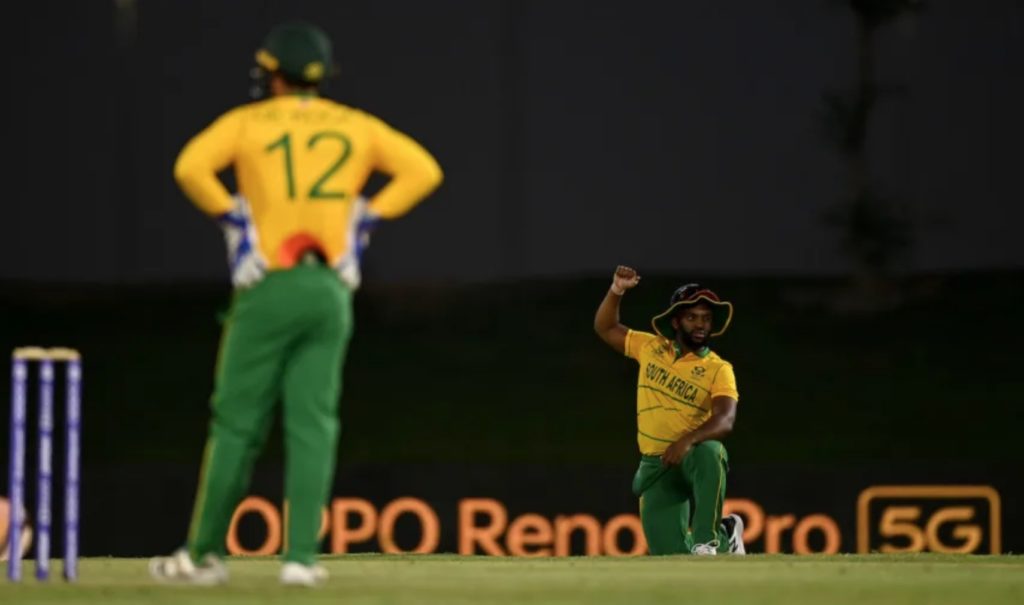Quinton de Kock has two options: leave the T20 World Cup voluntarily or be forced to betray his deeply held convictions to play the game he loves, writes RYAN VREDE.
I don’t see another option for De Kock, who on Tuesday decided to withdraw from the team minutes before the scheduled start of their Super 12 group match against the West Indies.
De Kock refused to comply with a Cricket South Africa board instruction to kneel, a symbolic show of solidarity with the Black Lives Matter movement.
His reason(s) for not wanting to kneel is a mystery. Those reasons could range from him not wanting to mix politics and sport, to him being a racist. We are unlikely to ever know because De Kock either refuses to face the media, or CSA is too concerned about what he will say if it puts him up.
Personally, it would be great if he knelt because, through education that birthed empathy with the life experience of his black teammates, he was convinced to do so.
Yet, him refusing to do so doesn’t diminish the power of the symbolism. For a coloured man who was born and raised on the Cape Flats, De Kock not kneeling is not critical to the cause’s advancement. His position just doesn’t transcend the truth that black lives matter.
So, I note his stance but am not disheartened by it, as millions of black South Africans appear to be.
The support of whites in the Proteas team, expressed through the act of kneeling, should be considered nice to have. The absence thereof is problematic in a myriad ways, but not terminal to a cause that belongs primarily to black Proteas. They should own and live it. The historical source of the problem can’t also now be granted the power to lend the movement validity through a co-sign.
It would certainly help if a player of De Kock’s stature was seen to be sincerely expressing his support for a movement that seeks nothing but equal opportunities. Indeed, it would be excellent if all white Proteas supported this pursuit. Yet, historically, movements for racial equality have not relied in any significant way on white support for their success. This one shouldn’t either.
I hope in time De Kock is educated on the complexities of the matter and the posture of his heart and mind changes. But I’m not invested in that process in a way that consumes me. The movement should and will continue without De Kock’s approval, as it will in every sporting code, despite many white athletes taking a similar stance, and thousands of white fans booing when athletes take the knee.
In this context, I was baffled by CSA’s directive to the players to kneel. It felt like an immature response to the criticism the team was taking for not having a unified stance. The optics weren’t good, and the amateurs leading CSA didn’t like the perception it was creating. So they forced compliance in a bid to appear powerful and in control. They are neither. They have failed dismally in setting up meaningful education programmes for their players on this matter. And in the absence of education, forced compliance is an understandably attractive option to cover up their leadership deficiencies.
It has achieved nothing but a showdown with arguably their most gifted batter. If De Kock feels so strongly about being made to kneel, he has no option but to leave the tournament. He will undoubtedly be missed as a player, but life will go on.
He also has the option to betray his convictions and kneel in order to play. This will require him to consciously choose an option that vexed his soul enough for him not to play against the Windies. Taking this option will tell us infinitely more about De Kock the man than it does De Kock the cricketer.
The other option is that CSA backtracks on its directive for the players to kneel. The incentive of having a world-class batter such as De Kock available could force its hand. CSA will look weak, but it has worn that dress with confidence for three years.
CSA’s history of incompetent leadership means it is entirely conceivable that it will soon release a media statement that reads something like: “After meaningful engagement with the players on this matter, CSA has decided to allow players to decide their stance based on their personal convictions. CSA is committed to engaging the players on this matter following the conclusion of the World Cup.”
Even with their deep dysfunction, I don’t see CSA going this route. That leaves De Kock, and perhaps others in the team who knelt against their convictions, to make the hardest decision of their career.
How the black players in the team respond now is more important than that decision, though. They have to retain their power and stand firm in the courage of their convictions.
De Kock will go on his terms, but, if he chooses to, he must stay on theirs. Those terms are simple – see our humanity, see our struggle, and support us.
ALSO READ: CSA’s draconian ‘taking the knee’ directive will divide, not unite







